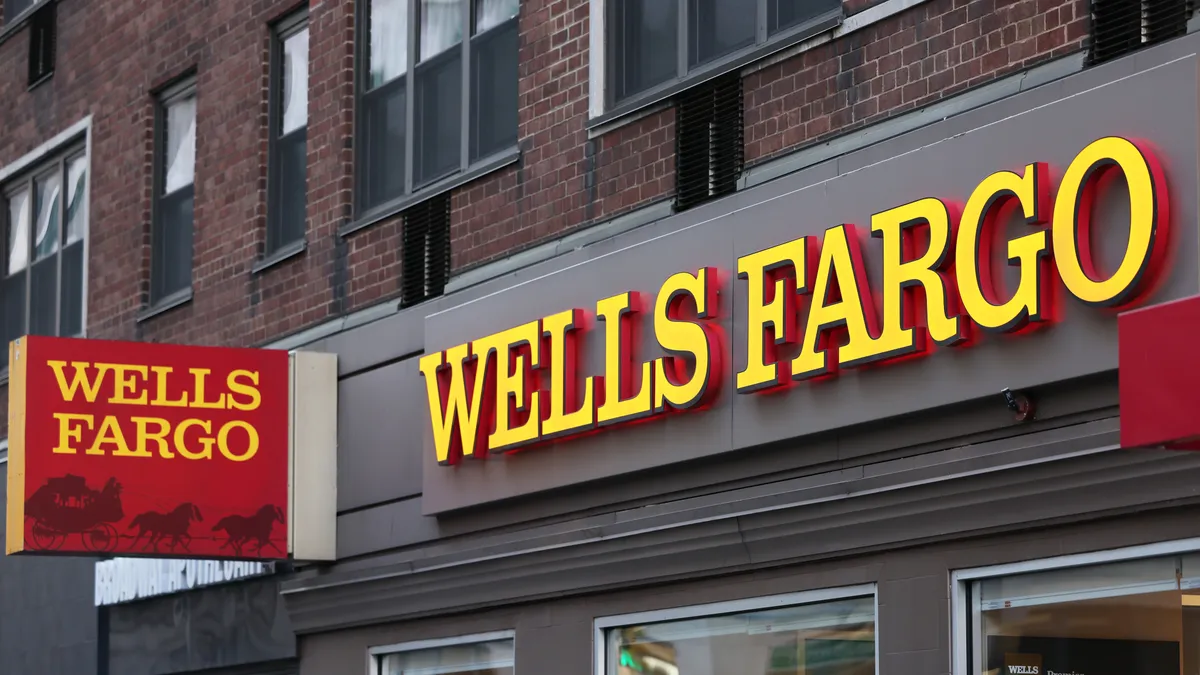Wells Fargo became the first bank of its size in the U.S. to have a unionized workforce Wednesday, when employees from an Albuquerque, New Mexico, branch voted 5-3 to join Wells Fargo Workers United.
“Despite Wells Fargo’s aggressive attempts to dissuade us, we are igniting a fire and showing our colleagues across the industry that not only is change possible, it is within reach,” Sabrina Perez, an Albuquerque-based senior premier banker at Wells Fargo, said in a statement, according to Bloomberg Law.
Employees at a Wells Fargo branch in Bethel, Alaska, had been scheduled to vote Thursday on whether to join the union, but workers withdrew the petition.
“We are pleased with this development and will continue to respect the rights of our employees to choose whether or not they want to be represented by a union," Amy Bonitatibus, Wells Fargo’s chief communications officer, said in a statement seen by Reuters.
Walker Sexton, a Bethel-based personal banker for Wells Fargo, said employees’ “values have not changed.”
“We believe Wells Fargo workers need a voice on the job,” Sexton said, according to American Banker. “We believe in being advocates for ourselves and our customers. We believe change at Wells Fargo is past due.”
The National Labor Relations Board will finalize the results of the Albuquerque vote if no one objects to the election in the next five days, The Wall Street Journal reported.
Employees at Wells branches in Daytona Beach, Florida, and Atwater, California, have filed for union elections that are expected to be held next month, two sources told Reuters.
Wells’ stance
Albuquerque-based Wells Fargo workers told the Guardian they began to organize in December 2020, after a Zoom call with bank CEO Charlie Scharf led them to believe Wells Fargo was ignoring their concerns about stagnant salaries, staffing levels and poor career mobility.
Perez sued Wells Fargo this month, claiming the bank improperly denies overtime pay to its senior premier bankers.
Sen. Sherrod Brown, D-OH, referenced Wells employees’ unionization efforts during a hearing this month in which Scharf and other bank CEOs testified in front of the Senate Banking Committee, which Brown leads.
When Brown asked Scharf if he’d remain neutral on the unionization effort, the CEO said Wells believes “it’s best that we have a direct relationship with those employees.”
“We do intend to exercise our right to speak with them to make sure that they make an informed decision,” Scharf said, according to The Wall Street Journal.
Brown called the unionization effort “an opportunity to show the American public truly a new day at Wells Fargo.”
“I’m sorry that you failed to show that real change is afoot at your bank,” Brown told Scharf.
At the same time, Wells Fargo has distributed fliers at some of the bank’s locations, suggesting employees be skeptical of the union. “Don’t be the union’s bait,” reads one flier seen by The Wall Street Journal and the Guardian.
“Employees should have all the facts and perspectives at their disposal on any important topic,” a Wells Fargo spokesperson told the Journal. “That is why we are communicating with our colleagues — just as the union has done.”
Mac Siruta, a Wells Fargo employee at the bank’s West Des Moines, Iowa, claims assistance center, dismissed that notion.
“[Scharf] said he was going to exercise his right to speak to workers about these issues,” Siruta told the Guardian. “No executive has spoken to me or anyone on my floor about these issues. There is no way for us to speak to the executives.”
Siruta expressed concern that Wells is losing talent to competitors offering higher pay. “Bank of America just raised their minimum wage to $23 an hour,” Siruta said. “So our best talent is going to go where they can make the most money or achieve the most success.”
Next steps
Wells’ Albuquerque branch workers will need to negotiate a collective bargaining agreement with the bank. That process, based on another bank’s recent union negotiations, could take more than a year.
It took roughly 18 months for employees at Oakland, California-based Beneficial State Bank to reach a collective bargaining agreement, from the time they voted to unionize in early 2020, according to The Wall Street Journal.
The effort resulted in the first new union at a U.S. bank for 40 years, the Communications Workers of America told the Financial Times.
“We firmly believe in the right for employees to have self-determination,” Beneficial’s CEO, Randell Leach, told The Wall Street Journal.
Bank of America and Citi staffers have contacted the Communications Workers of America to express their interest in organizing, with concerns on similar issues to those that Wells workers raised, Nick Weiner, an organizer for the union, told the Financial Times.





















